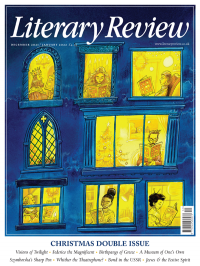Charles Shaar Murray
Wish You Were There?
Through the Prism: Untold Rock Stories from the Hipgnosis Archive
By Aubrey Powell
Thames & Hudson 320pp £30
Half a century or so ago, in a world bearing only an incidental resemblance to the one we currently inhabit, the record collection of any aficionado of ‘progressive rock’ would inevitably include album sleeves with designs credited to Hipgnosis. The Hipgnosis signature technique involved elaborately staged or – though it wasn’t immediately apparent – cunningly manipulated photography: photoshopping before Photoshop. The hallucinatory visions that graced the sleeves of such albums as Pink Floyd’s Wish You Were Here (which shows two besuited men shaking hands on a sunlit plaza, one of them a stuntman on fire) and Led Zeppelin’s Houses of the Holy (featuring naked blond children climbing up huge columns of rock; only two children were photographed, and the images were replicated in the darkroom) were created the hard way: someone had to stage the setting and take the photographs. In those pre-digital days, ‘picture research’ didn’t mean a Google search, but a skim through piles of old books and magazines.
In the case of Hipgnosis, that someone was co-founder Aubrey Powell, the more practical, personable and business-minded half of the founding partnership, who worked alongside Storm Thorgerson, the cantankerous visionary and conceptualiser who derived ideas from dream imagery and esoteric visual puns. When Thorgerson had a dream in which

Sign Up to our newsletter
Receive free articles, highlights from the archive, news, details of prizes, and much more.@Lit_Review
Follow Literary Review on Twitter
Twitter Feed
Under its longest-serving editor, Graydon Carter, Vanity Fair was that rare thing – a New York society magazine that published serious journalism.
@PeterPeteryork looks at what Carter got right.
Peter York - Deluxe Editions
Peter York: Deluxe Editions - When the Going Was Good: An Editor’s Adventures During the Last Golden Age of Magazines by Graydon Carter
literaryreview.co.uk
Henry James returned to America in 1904 with three objectives: to see his brother William, to deliver a series of lectures on Balzac, and to gather material for a pair of books about modern America.
Peter Rose follows James out west.
Peter Rose - The Restless Analyst
Peter Rose: The Restless Analyst - Henry James Comes Home: Rediscovering America in the Gilded Age by Peter Brooks...
literaryreview.co.uk
Vladimir Putin served his apprenticeship in the KGB toward the end of the Cold War, a period during which Western societies were infiltrated by so-called 'illegals'.
Piers Brendon examines how the culture of Soviet spycraft shaped his thinking.
Piers Brendon - Tinker, Tailor, Sleeper, Troll
Piers Brendon: Tinker, Tailor, Sleeper, Troll - The Illegals: Russia’s Most Audacious Spies and the Plot to Infiltrate the West by Shaun Walker
literaryreview.co.uk